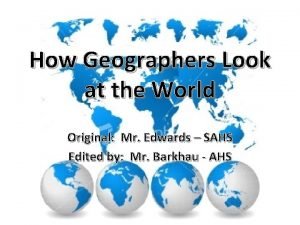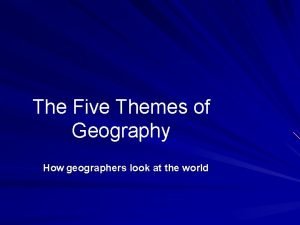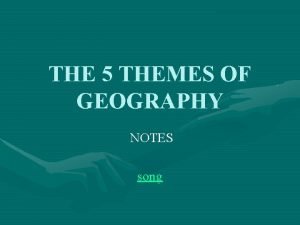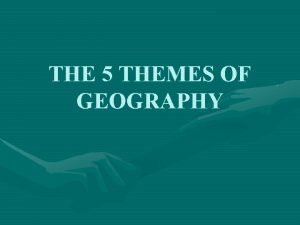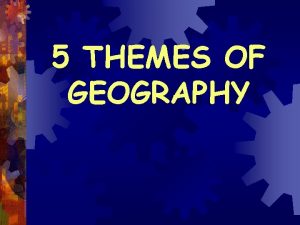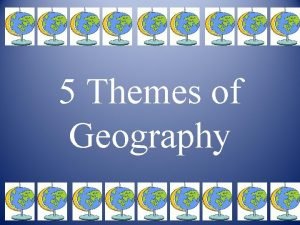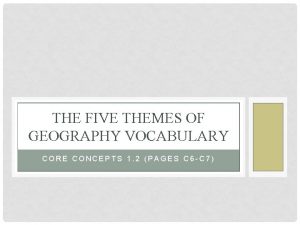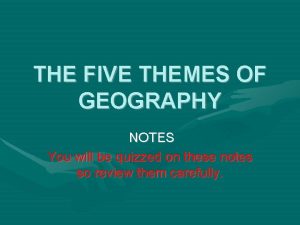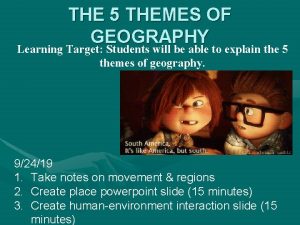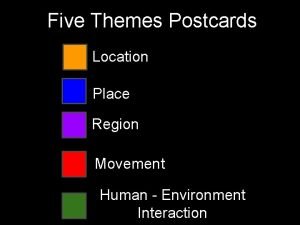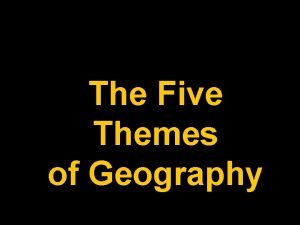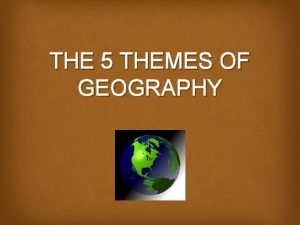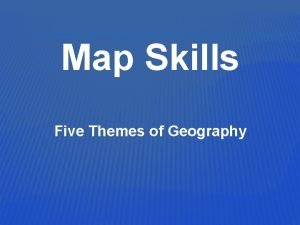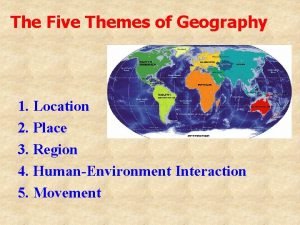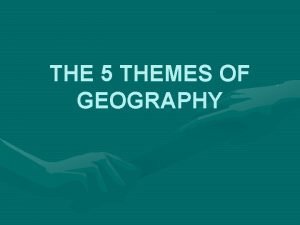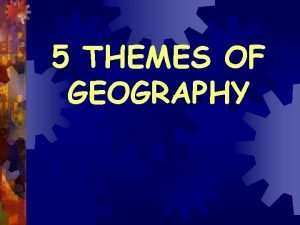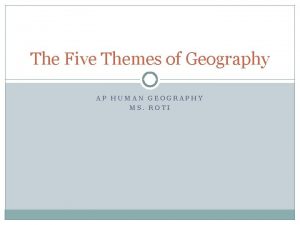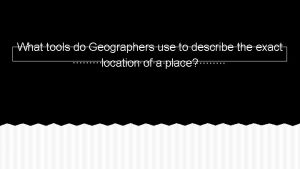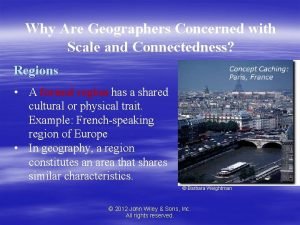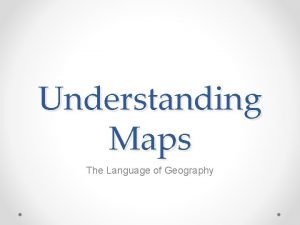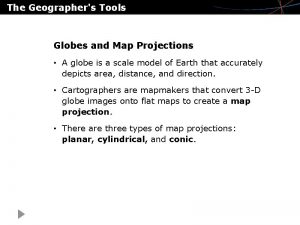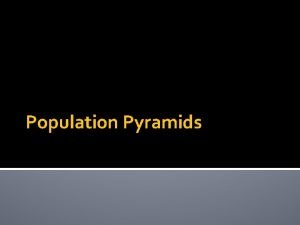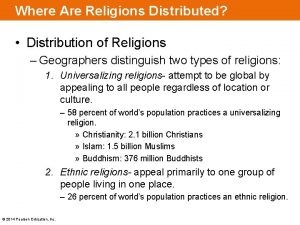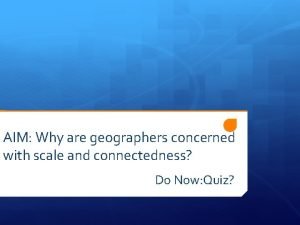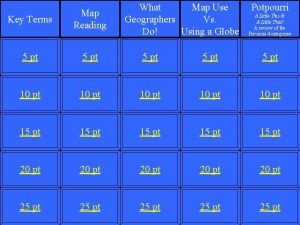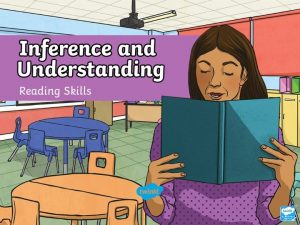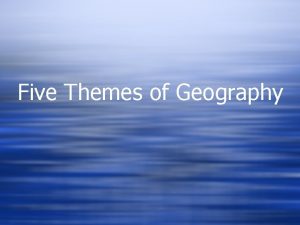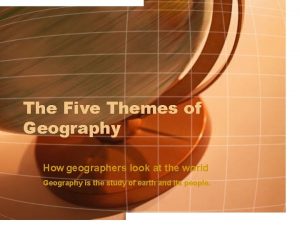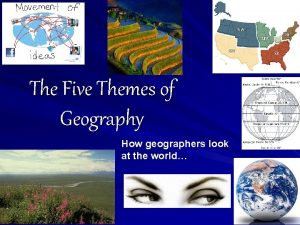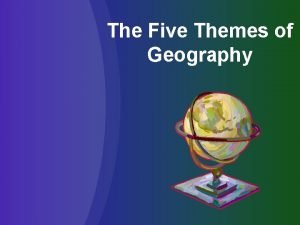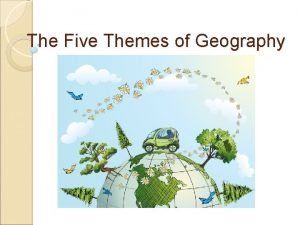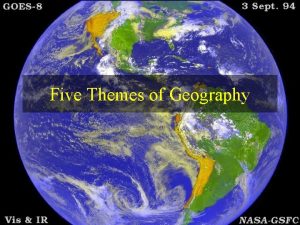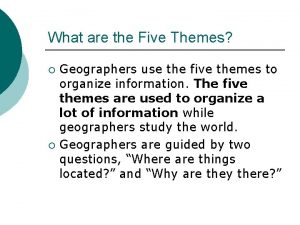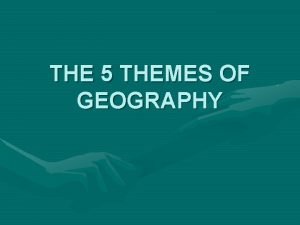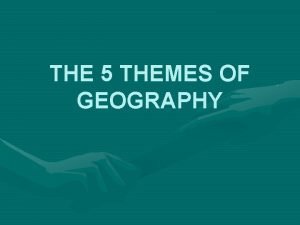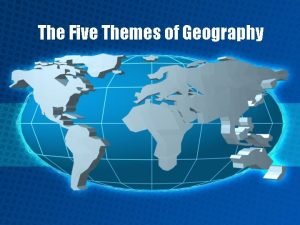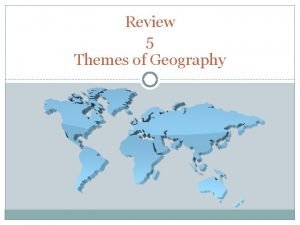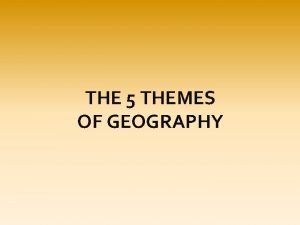The Five Themes of Geography How geographers look































- Slides: 31

The Five Themes of Geography How geographers look at the world…

Why study geography? n n n To understand more about the changing world we live in To learn more about the people and cultures of the world so that we can better understand each other To evaluate the connection between the earth and those who live on it

What are the Five Themes of Geography? n The concepts that geographers use to study the world and the people that inhabit it. n They are all connected; Use all five themes to truly understand the geography of a place n The 5 themes are: location, place, movement, humanenvironment interaction, and region

Location Asks the question: Where is it? Here’s Madagascar!

Can be absolute location, which uses a system to find an exact spot on the earth. Examples: latitude and longitude, address with zip codes, GPS, map coordinates

► Turner Field is located at 755 Hank Aaron Drive

Can be relative location, which uses descriptions to find places on the earth. Example: I live in Marietta near the Big Chicken.

THE BIG CHICKEN!

The girl lived at the north end of the Golden Gate Bridge.

Place Asks: What is it like? This can be described physically or culturally.

Can be physical features • Climate – temperature, rainfall • Landforms – plateaus, plains • Topography - elevation • Flora - plants • Fauna - animals • Resources – petroleum, gemstones

Can be human characteristics

Current photograph of Peachtree Street in Atlanta, Georgia

Place For example, how would you describe Marietta, Georgia?


Movement How do people, goods and ideas get from one place to another?

Examples of Movement ► Trading products between countries ► Migration of people to new areas ► Buying clothes over the internet ► Face-timing with someone overseas ► Coming to school on the bus this morning

Movement can be intangible: religion, ideas, disease


Human Environment Interaction How do people interact with the physical world?

People learn to use what the environment has to offer and change the environment to meet their needs.

Region Are there common characteristics of a given area?

There are three different types of regions: formal, functional, and vernacular • Formal Region – defined by a limited number of characteristics EX: The Corn belt in the US Is characterized by a specific climate, land use patterns, and resources.

• Functional Region – serves a particular purpose and has specific BOUNDARIES! • Organized around a set of interactions and connections between places. EX: METRO ATLANTA

• Vernacular Region (Perceptual) – people’s perceptions (NO specific BOUNDARIES!) Regions can overlap!! Is Texas in the “South” OR the “West”? --Depends on how you feel!

ON YOUR POSTER n Write theme at top of page (distinct and sizeable) n Write question being asked n Give examples of your theme that help explain everything on your clue sheet. n Draw a picture to illustrate your theme n Visually pleasing, neat, informative n All group members must be able to explain your theme in your own words n A rough draft must be ok’ed by me before you make poster

LOCATION n Question asked: Where is it? n Can be… n Absolute location: uses a system to show an exact spot on earth’s surface. n Relative location: uses descriptions to find places on earth’s surface. n Give an example of each on your poster Think: How do you know where things are?

PLACE n Question asked: What is it like? n A place can be described physically or culturally. n Choose a well known place to describe for your poster Think: What does it look like? What are the people like?

MOVEMENT n Question asked: How do things get from one place to another? Think: Are all of these “things” tangible? What else moves throughout the world besides people?

REGION n Question asked: What areas share common characteristics? n Regions are imaginary borders that include areas that share things in common Think: Do characteristics have to be tangible things? Are borders created for regions definite and distinct? How do people’s perceptions impact regions?

HUMAN ENVIRONMENT INTERACTION n Question asked: How do people interact with the physical world? n How do we use the environment to our advantage? Think: What are positives and negatives to human interaction with the environment?
 Look up look down look around
Look up look down look around A central place and the surrounding territory linked to it
A central place and the surrounding territory linked to it How geographers look at the world worksheet answers
How geographers look at the world worksheet answers 5 themes of geography song
5 themes of geography song France 5 themes of geography
France 5 themes of geography The 5 themes of geography
The 5 themes of geography Definition of the five themes of geography
Definition of the five themes of geography 5 themes of geography posters
5 themes of geography posters 5 themes of geography vocabulary
5 themes of geography vocabulary Five themes of geography notes
Five themes of geography notes What are five themes of geography
What are five themes of geography Aspects of geography
Aspects of geography 5 themes of geography postcards
5 themes of geography postcards 5 themes of geography pictures example
5 themes of geography pictures example Poniferous
Poniferous Movement five themes of geography
Movement five themes of geography Movement five themes of geography
Movement five themes of geography 5 themes of geography mexico
5 themes of geography mexico Five themes of geography definition
Five themes of geography definition Place 5 themes of geography definition
Place 5 themes of geography definition 5 themes of geography ap human geography
5 themes of geography ap human geography Geographers tools
Geographers tools Formal vs functional region
Formal vs functional region Why do geographers call arabia a crossroads location
Why do geographers call arabia a crossroads location A primary reason that geographers study maps is to
A primary reason that geographers study maps is to Geographers tools
Geographers tools Why do geographers use population pyramids
Why do geographers use population pyramids 3 major branches of christianity
3 major branches of christianity Why are geographers concerned with scale and connectedness
Why are geographers concerned with scale and connectedness What basic questions guide geographers
What basic questions guide geographers Look at the image in activity 1
Look at the image in activity 1 What's in activity 1 looking back
What's in activity 1 looking back

